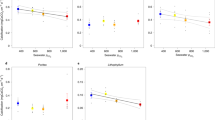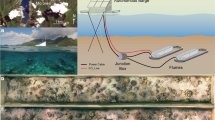Abstract
Due to the elevated atmospheric carbon dioxide, ocean acidification (OA) has recently emerged as a research theme in marine biology due to an expected deleterious effect of altered seawater chemistry on calcification. A system simulating future OA scenario is crucial for OA-related studies. Here, we designed an OA-simulated system (OASys) with three solenoid-controlled CO2 gas channels. The OASys can adjust the pH of the seawater by bubbling CO2 gas into seawaters via feedback systems. The OASys is very simple in structure with an integrated design and is new-user friendly with the instruction. Moreover, the OASys can monitor and record real-time pH values and can maintain pH levels within 0.02 pH unit. In a 15-d experiment, the OASys was applied to simulate OA in which the expected target pH values were 8.00, 7.80 and 7.60 to study the calcifying response of Galaxea fascicularis. The results showed daily mean seawater pH values held at pH 8.00±0.01, 7.80±0.01 and 7.61±0.01 over 15 d. Correspondingly, the coral calcification of G. fascicularis gradually decreased with reduced pH.
Similar content being viewed by others
References
Abbasi T, Abbasi S A. 2011. Ocean acidification: the newest threat to the global environment. Critical Reviews in Environmental Science and Technology, 41(8): 1601–1663
Albright R, Langdon C. 2011. Ocean acidification impacts multiple early life history processes of the Caribbean coral Porites astreoides. Global Change Biology, 17(7): 2478–2487, doi: 10.1111/j.1365-2486.2011.02404.x
Andersson A J, Kuffner I B, Mackenzie F T, et al. 2009. Net loss of CaCO3 from a subtropical calcifying community due to seawater acidification: mesocosm-scale experimental evidence. Biogeosciences, 6(8): 1811–1823, doi: 10.5194/bg-6-1811-2009
Anthony K R N, Kline D I, Diaz-Pulido G, et al. 2008. Ocean acidification causes bleaching and productivity loss in coral reef builders. Proceedings of the National Academy of Sciences of the United States of America, 105(45): 17442–17446, doi: 10.1073/pnas.0804478105
Barry J P, Lovera C, Okuda C, et al. 2008. A gas-controlled aquarium system for ocean acidification studies. In: OCEANS 2008-MTS/IEEE Kobe Techno-Ocean. Kobe, Japan: IEEE, 1–5
Buddemeier R W, Jokiel P L, Zimmerman K M, et al. 2008. A modeling tool to evaluate regional coral reef responses to changes in climate and ocean chemistry. Limnology and Oceanography: Methods, 6(9): 395–411, doi: 10.4319/lom.2008.6.395
Carreiro-Silva M, Cerqueira T, Godinho A, et al. 2014. Molecular mechanisms underlying the physiological responses of the cold-water coral Desmophyllum dianthus to ocean acidification. Coral Reefs, 33(2): 465–476, doi: 10.1007/s00338-014-1129-2
Chauvin A, Denis V, Cuet P. 2011. Is the response of coral calcification to seawater acidification related to nutrient loading?. Coral Reefs, 30(4): 911–923, doi: 10.1007/s00338-011-0786-7
Codarin A, Wysocki L E, Ladich F, et al. 2009. Effects of ambient and boat noise on hearing and communication in three fish species living in a marine protected area (Miramare, Italy). Marine Pollution Bulletin, 58(12): 1880–1887, doi: 10.1016/j.marpolbul. 2009.07.011
Comeau S, Carpenter R C, Edmunds P J. 2013a. Response to coral reef calcification: carbonate, bicarbonate and proton flux under conditions of increasing ocean acidification. Proceedings of the Royal Society B: Biological Sciences, 280(1764): 20131153, doi: 10.1098/rspb.2013.1153
Comeau S, Carpenter R C, Nojiri Y, et al. 2014a. Pacific-wide contrast highlights resistance of reef calcifiers to ocean acidification. Proceedings of the Royal Society B: Biological Sciences, 281(1790): 20141339, doi: 10.1098/rspb.2014.1339
Comeau S, Edmunds P J, Spindel N B, et al. 2013b. The responses of eight coral reef calcifiers to increasing partial pressure of CO2 do not exhibit a tipping point. Limnology and Oceanography, 58(1): 388–398, doi: 10.4319/lo.2013.58.1.0388
Comeau S, Edmunds P J, Spindel N B, et al. 2014b. Fast coral reef calcifiers are more sensitive to ocean acidification in short-term laboratory incubations. Limnology and Oceanography, 59(3): 1081–1091, doi: 10.4319/lo.2014.59.3.1081
Davies P S. 1989. Short-term growth measurements of corals using an accurate buoyant weighing technique. Marine Biology, 101(3): 389–395, doi: 10.1007/BF00428135
Dickson A G, Sabine C L, Christian J R. 2007. Guide to best practices for ocean CO2 measurements. Sidney, Canada: North Pacific Marine Science Organization
Doney S C, Balch W M, Fabry V J, et al. 2009. Ocean acidification: a critical emerging problem for the ocean sciences. Oceanography, 22(4): 16–25, doi: 10.5670/oceanog
Dufault A M, Ninokawa A, Bramanti L, et al. 2013. The role of light in mediating the effects of ocean acidification on coral calcification. Journal of Experimental Biology, 216(9): 1570–1577, doi: 10.1242/jeb.080549
Edmunds P J. 2011. Zooplanktivory ameliorates the effects of ocean acidification on the reef coral Porites spp.. Limnology and Oceanography, 56(6): 2402–2410, doi: 10.4319/lo.2011. 56.6.2402
Edmunds P J, Cumbo V R, Fan T Y. 2013. Metabolic costs of larval settlement and metamorphosis in the coral Seriatopora caliendrum under ambient and elevated pCO2. Journal of Experimental Marine Biology and Ecology, 443: 33–38, doi: 10.1016/j.jembe.2013.02.032
Erez J, Reynaud S, Silverman J, et al. 2011. Coral calcification under ocean acidification and global change. In: Dubinsky Z, Stambler N, eds. Coral Reefs: An Ecosystem in Transition. Dordrecht: Springer, 151–176
Evensen N R, Edmunds P J. 2018. Effect of elevated pCO2 on competition between the scleractinian corals Galaxea fascicularis and Acropora hyacinthus. Journal of Experimental Marine Biology and Ecology, 500: 12–17, doi: 10.1016/j.jembe.2017.12.002
Fabry V J, Seibel B A, Feely R A, et al. 2008. Impacts of ocean acidification on marine fauna and ecosystem processes. ICES Journal of Marine Science, 65(3): 414–432, doi: 10.1093/icesjms/fsn048
Fangue N A, O'Donnell M J, Sewell M A, et al. 2010. A laboratorybased, experimental system for the study of ocean acidification effects on marine invertebrate larvae. Limnology and Oceanography: Methods, 8(8): 441–452, doi: 10.4319/lom.2010.8.441
Gattuso J P, Allemand D, Frankignoulle M. 1999. Photosynthesis and calcification at cellular, organismal and community levels in coral reefs: a review on interactions and control by carbonate chemistry. Integrative and Comparative Biology, 39(1): 160–183
Hillhouse E W, Grammatopoulos D K. 2006. The molecular mechanisms underlying the regulation of the biological activity of corticotropin-releasing hormone receptors: implications for physiology and pathophysiology. Endocrine Reviews, 27(3): 260–286, doi: 10.1210/er.2005-0034
Hoegh-Guldberg O, Mumby P J, Hooten A J, et al. 2007. Coral reefs under rapid climate change and ocean acidification. Science, 318(5857): 1737–1742, doi: 10.1126/science.1152509
Hofmann G E, Barry J P, Edmunds P J, et al. 2010. The effect of ocean acidification on calcifying organisms in marine ecosystems: an organism-to-ecosystem perspective. Annual Review of Ecology, Evolution, and Systematics, 41: 127–147, doi: 10.1146/annurev. ecolsys.110308.120227
Hofmann G E, O'Donnell M J, Todgham A E. 2008. Using functional genomics to explore the effects of ocean acidification on calcifying marine organisms. Marine Ecology Progress Series, 373: 219–225, doi: 10.3354/meps07775
Huang Hui, Yuan Xiangcheng, Cai Weijun, et al. 2014. Positive and negative responses of coral calcification to elevated pCO2: case studies of two coral species and the implications of their responses. Marine Ecology Progress Series, 502: 145–156, doi: 10.3354/meps10720
Iguchi A, Ozaki S, Nakamura T, et al. 2012. Effects of acidified seawater on coral calcification and symbiotic algae on the massive coral Porites australiensis. Marine Environmental Research, 73: 32–36, doi: 10.1016/j.marenvres.2011.10.008
Jokiel P L. 2011. Ocean acidification and control of reef coral calcification by boundary layer limitation of proton flux. Bulletin of Marine Science, 87(3): 639–657, doi: 10.5343/bms.2010.1107
Jokiel P L, Rodgers K S, Kuffner I B, et al. 2008. Ocean acidification and calcifying reef organisms: a mesocosm investigation. Coral Reefs, 27(3): 473–483, doi: 10.1007/s00338-008-0380-9
Kleypas J A, Buddemeier R W, Archer D, et al. 1999. Geochemical consequences of increased atmospheric carbon dioxide on coral reefs. Science, 284(5411): 118–120, doi: 10.1126/science. 284.5411.118
Langdon C, Atkinson M J. 2005. Effect of elevated pCO2 on photosynthesis and calcification of corals and interactions with seasonal change in temperature/irradiance and nutrient enrichment. Journal of Geophysical Research: Oceans, 110(C9): C09S07
Langdon C, Takahashi T, Sweeney C, et al. 2000. Effect of calcium carbonate saturation state on the calcification rate of an experimental coral reef. Global Biogeochemical Cycles, 14(2): 639–654, doi: 10.1029/1999GB001195
Leclercq N, Gattuso J P, Jaubert J. 2002. Primary production, respiration, and calcification of a coral reef mesocosm under increased CO2 partial pressure. Limnology and Oceanography, 47(2): 558–564, doi: 10.4319/lo.2002.47.2.0558
Marubini F, Atkinson M J. 1999. Effects of lowered pH and elevated nitrate on coral calcification. Marine Ecology Progress Series, 188: 117–121, doi: 10.3354/meps188117
Marubini F, Ferrier-Pagès C, Furla P, et al. 2008. Coral calcification responds to seawater acidification: a working hypothesis towards a physiological mechanism. Coral Reefs, 27(3): 491–499, doi: 10.1007/s00338-008-0375-6
McCulloch M, Falter J, Trotter J, et al. 2012a. Coral resilience to ocean acidification and global warming through pH up-regulation. Nature Climate Change, 2(8): 623–627, d o i: 1 0. 1 0 3 8 /nclimate1473
McCulloch M, Trotter J, Montagna P, et al. 2012b. Resilience of coldwater scleractinian corals to ocean acidification: Boron isotopic systematics of pH and saturation state up-regulation. Geochimica et Cosmochimica Acta, 87: 21–34, doi: 10.1016/j.gca.2012.03.027
McGraw C M, Cornwall C E, Reid M R, et al. 2010. An automated pHcontrolled culture system for laboratory-based ocean acidification experiments. Limnology and Oceanography: Methods, 8(12): 686–694, doi: 10.4319/lom.2010.8.0686
Orr J C, Fabry V J, Aumont O, et al. 2005. Anthropogenic ocean acidification over the twenty-first century and its impact on calcifying organisms. Nature, 437(7059): 681–686, doi: 10.1038/nature04095
Ries J B. 2011. A physicochemical framework for interpreting the biological calcification response to CO2-induced ocean acidification. Geochimica et Cosmochimica Acta, 75(14): 4053–4064, doi: 10.1016/j.gca.2011.04.025
Rivest E B, Hofmann G E. 2014. Responses of the metabolism of the larvae of Pocillopora damicornis to ocean acidification and warming. PLoS One, 9(4): e96172, doi: 10.1371/journal. pone.0096172
Rodolfo-Metalpa R, Martin S, Ferrier-Pagès C, et al. 2010. Response of the temperate coral Cladocora caespitosa to mid-and longterm exposure to pCO2 and temperature levels projected for the year 2100 AD. Biogeosciences, 7(1): 289–300, doi: 10.5194/bg-7-289-2010
Slabbekoorn H, Bouton N, Van Opzeeland I, et al. 2010. A noisy spring: the impact of globally rising underwater sound levels on fish. Trends in Ecology & Evolution, 25(7): 419–427
Smith J N, Strahl J, Noonan S H C, et al. 2016. Reduced heterotrophy in the stony coral Galaxea fascicularis after life-long exposure to elevated carbon dioxide. Scientific Reports, 6: 27019, doi: 10.1038/srep27019
Takahashi A, Kurihara H. 2013. Ocean acidification does not affect the physiology of the tropical coral Acropora digitifera during a 5-week experiment. Coral Reefs, 32(1): 305–314, d o i: 10.1007/s00338-012-0979-8
Tanaka K, Holcomb M, Takahashi A, et al. 2015. Response of Acropora digitifera to ocean acidification: constraints from δ11B, Sr, Mg, and Ba compositions of aragonitic skeletons cultured under variable seawater pH. Coral Reefs, 34(4): 1139–1149, doi: 10.1007/s00338-015-1319-6
Zheng Xinqing, Kuo Fuwen, Pan Ke, et al. 2018. Different calcification responses of two hermatypic corals to CO2-driven ocean acidification. Environmental Science and Pollution Research,: doi: 10.1007/s11356-018-1376-9
Zheng Xinqing, Li Yuanchao, Lin Rongcheng, et al. 2013. Coral reef conservation and restoration in Mainland China. Malysian Journal of Science, 32(SI): 221–238
Author information
Authors and Affiliations
Corresponding authors
Additional information
Foundation item: The China-ASEAN Maritime Cooperation Fund Project “China-ASEAN Countries Collaboration on Marine Endangered Species Researches” and “China-ASEAN Marine Protected Areas Ecosystem Management Network”, Regional Demonstration of Marine Economy Innovative Development Project under contract No. 16PZY002SF18; the China-Indonesia Maritime Cooperation Fund Project “China-Indonesia Bitung Ecological Station Establishment”; the National Natural Science Foundation of China under contract No. 41506123.
Rights and permissions
About this article
Cite this article
Zheng, X., Wang, C., Hadi, T.A. et al. An ocean acidification-simulated system and its application in coral physiological studies. Acta Oceanol. Sin. 37, 55–62 (2018). https://doi.org/10.1007/s13131-018-1223-3
Received:
Accepted:
Published:
Issue Date:
DOI: https://doi.org/10.1007/s13131-018-1223-3




